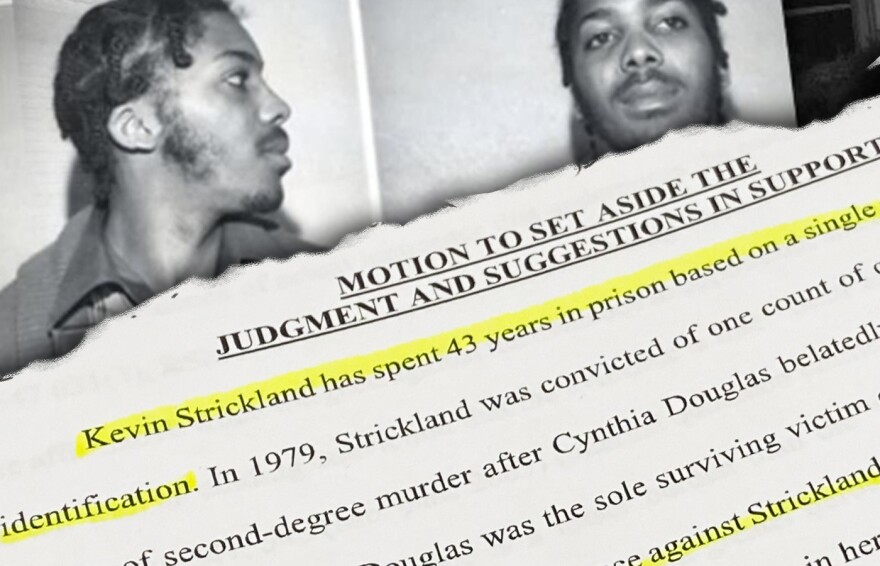Less than 24 hours before the innocence hearing for Kevin Strickland was set to begin, Missouri’s Western District Court of Appeals on Thursday ordered the hearing delayed, in response to an emergency filing from Missouri Attorney General Eric Schmitt.
The hearing would have been Jackson County Prosecutor Jean Peters Baker's first opportunity to appeal directly for Strickland's release in the court that handed down his conviction.
Instead, the judge and attorneys involved will meet on Thursday to decide when to reschedule the hearing.
Why was the hearing delayed?
Jackson County Circuit Court Judge Kevin Harrell had originally set Strickland’s hearing date for Thursday, Sept. 2.
On Wednesday, Missouri Attorney General Eric Schmitt’s office asked the judge to delay the hearing, a request that was granted Thursday afternoon.
“The Court’s hearing schedule deprives the Attorney General of adequate time to investigate whether any of the physical evidence should be retested before the hearing … (and) to subpoena witnesses to attend the hearing,” Schmitt’s office wrote in a court filing. “The Attorney General cannot meaningfully prepare for this hearing in the three days between when the hearing is ordered and when it is scheduled to take place.”
A new date for the hearing has yet to be determined.
What are the possible outcomes?
Harrell could decide that Strickland’s 1979 guilty verdict was appropriate and fair, in which case Strickland would remain behind bars. If the verdict stands, Strickland and his team of attorneys from the Midwest Innocence Project would be able to appeal his case to a higher court.
The judge could also decide that Strickland’s conviction should be set aside. If that happens, Strickland would likely be released quickly — maybe the same day.

It is still not clear if the attorney general could appeal if Harrell sides with Strickland. The judge has determined that, under the new Missouri law that has allowed the Jackson County Prosecutor to work for Strickland’s exoneration, Schmitt cannot be a party to the case and has struck all the motions he has filed. Schmitt’s office will, however, be allowed to question witnesses and present arguments at the innocence hearing.
Instead, Jackson County Prosecutor Jean Peters Baker, who announced in May that Strickland is innocent, will represent the state of Missouri.
When is the earliest Strickland could be released?
It's still unclear.
Before the judge delayed the hearing, he had ordered the state to bring Strickland to the Jackson County Circuit Court for a hearing on Friday, Sept. 3, at 10 a.m. — a decision that appeared to suggest Strickland may be free as early as Friday.
That would have been one day before the Strickland family plans to bury Rosetta Thorton, Strickland's mother, who died Aug. 21. "Our mother meant a tremendous amount to us," Strickland’s older brother, L.R., told KCUR. "We were very, very close.”
It would be the third family funeral Strickland has missed; his father died in 2011, followed by one of his sisters about a year later. The family has started a GoFundMe to help pay for their mother's funeral costs.
What evidence shows Strickland is innocent?
Strickland’s 1979 conviction hinged on the eyewitness testimony of Cynthia Douglas, who was wounded in the shooting. According to a filing from the Jackson County Prosecutor’s office, Douglas realized the same year that she was mistaken in her identification of Strickland.
And ”After years of torment and consternation over what to do about the mistake," prosecutors wrote in a motion this week, Douglas asked for help from the Midwest Innocence Project in 2009.
Two other men identified by Douglas, both of whom pleaded guilty, have said that Strickland wasn’t involved in the murders.
Baker’s motion also added that, as late as 2020, a fingerprint analysis showed prints taken from the shotgun used in the killings do not belong to Strickland.
The motion also suggests the 1979 case was racially biased.

"Armed with only tainted identification and weak physical evidence, it took two trials for the State to convict Strickland," Baker’s office wrote. The first ended in a mistrial, which prosecutors at the time blamed on the inclusion of a lone Black juror.
The then-prosecutor said the seating of that juror was "careless," and a "mistake that would not be repeated," the motion said. At the second trial, Strickland was convicted by an all-white jury.
Why did it take so long for the prosecutor to file this motion?
Baker first announced her conclusion that Strickland is innocent on May 10, but has been unable to make direct appeals on his behalf until this week. That’s when a new state law went into effect allowing local prosecutors to revisit wrongful convictions in the courts that handed them down, a maneuver missing in the state since 1988.
Before the change, Strickland’s attorneys would have been forced to argue his innocence in DeKalb County, where he is detained and where Baker’s office has no authority.
Who is Judge Kevin Harrell?
According to his 16th Circuit Court biography, Judge Kevin Harrell is a Kansas City native who attended the University of Missouri-Kansas City School of Law, graduating in 1988.
Before his appointment in 2012 by then-Gov. Jay Nixon, Harrell worked for 15 years in the Jackson County Prosecutor’s Office, and became the chief deputy prosecuting attorney.
From 2002 to 2010, Harrell taught and lectured for several colleges and associations, including the National District Attorneys Association, and was voted by his colleagues as the Victim Champion of the Year in 2001 and 2003.





